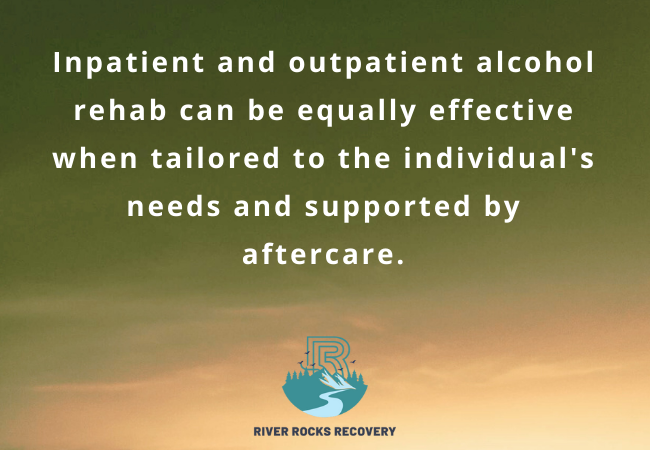Struggling with alcohol addiction is not a sign of weakness—it’s a call for help. And thankfully, help comes in many forms. For individuals seeking recovery, one of the most important decisions they will face is choosing between inpatient and outpatient alcohol rehab. Both approaches offer unique benefits and support systems, but the right choice often depends on a person’s specific needs, severity of addiction, home environment, and lifestyle.
Understanding these two options—and what each involves—can bring clarity and confidence when stepping into the recovery journey. Here’s a closer look at how inpatient and outpatient alcohol rehab programs differ, their key features, and which one may be best suited for different individuals.
The Foundation of Alcohol Rehab
Alcohol addiction doesn’t develop overnight. It’s a progressive condition that affects the body, mind, and emotional well-being. A structured treatment plan is essential to address the physical withdrawal symptoms, the psychological impact of long-term alcohol use, and the behavioral patterns that fuel the cycle of addiction.
Rehab centers provide individuals with a safe, supportive environment where they can step away from everyday stressors and focus fully on healing. Whether you choose inpatient or outpatient care, the goal remains the same: lasting sobriety, personal growth, and a path back to a fulfilling life.
What Is Inpatient Alcohol Rehab?
Inpatient alcohol rehab, often referred to as residential treatment, involves living at a treatment facility full-time. Clients receive 24/7 supervision and care in a highly structured environment. This type of program is generally recommended for individuals with severe alcohol dependence, a history of relapse, or co-occurring mental health conditions.
A typical inpatient stay may last anywhere from 30 to 90 days or longer, depending on progress and needs. During this time, individuals engage in a daily schedule that includes medical monitoring, therapy sessions, group activities, and wellness practices such as nutrition and exercise. The immersive nature of inpatient care removes clients from triggering environments, allowing them to focus solely on recovery.
Benefits of Inpatient Rehab
One of the biggest advantages of inpatient rehab is its ability to provide round-the-clock medical support, particularly during the early detox phase. Alcohol withdrawal can be dangerous without proper care, especially for those who have been drinking heavily over a long period.
In addition to medical oversight, inpatient programs also offer intensive therapeutic support. Individual counseling, group therapy, trauma-informed care, and holistic approaches are all part of the experience. Clients benefit from peer support, structured daily routines, and an environment that minimizes distractions and access to alcohol.
Who Is a Good Fit for Inpatient Rehab?
Inpatient rehab may be ideal for someone who:
-
Has a long-term or severe alcohol use disorder
-
Has previously attempted outpatient treatment without success
-
Lives in an unstable or triggering home environment
-
Has co-occurring mental health disorders such as depression or anxiety
-
Needs a fully immersive, structured environment to reset and recover
Choosing this path often requires taking time away from work, family, or school, but for many, the investment pays off in life-changing ways.
What Is Outpatient Alcohol Rehab?
Unlike inpatient treatment, outpatient rehab allows individuals to live at home while attending therapy and treatment sessions at scheduled times throughout the week. This flexibility enables clients to maintain work, family obligations, or education while still receiving professional support for recovery.
There are different levels of outpatient care depending on a person’s needs. A standard Outpatient Treatment Program in Middletown, Ohio typically involves fewer hours of therapy per week, making it best suited for those with mild to moderate alcohol use disorders or individuals transitioning from a higher level of care.
Intensive and Partial Outpatient Options
Not all outpatient programs are created equal. More structured and time-intensive versions exist to provide increased support without requiring full-time residency. For example, an Intensive Outpatient Program in Middletown, Ohio might involve several hours of group and individual therapy multiple days per week. This level of care serves as a bridge between inpatient and traditional outpatient programs, offering more structure while still allowing the individual to live at home.
Similarly, a Partial Hospitalization Program in Middletown, Ohio—sometimes called PHP—is the most intensive form of outpatient care. Clients in a PHP typically spend five to six hours a day, five days a week, at the facility, participating in therapeutic activities and clinical services. This program is ideal for those who need significant support but are stable enough not to require overnight supervision.
Advantages of Outpatient Care
Outpatient rehab programs offer the benefit of flexibility. Individuals can continue fulfilling their daily responsibilities while still receiving treatment. This approach is also generally more affordable than inpatient care, making it accessible to a wider range of people.
Another important aspect of outpatient treatment is its emphasis on integrating recovery into real life. Clients return home each day and learn to apply coping strategies in real-time, which helps build long-term resilience. The continued access to family and social support can also reinforce motivation and commitment.
However, outpatient programs do require a high level of personal responsibility and commitment. Because individuals remain in their everyday environment, they must be ready to manage triggers and stressors without the safety net of 24/7 care.

Which One Is Right for You?
Deciding between inpatient and outpatient rehab comes down to individual needs. There’s no one-size-fits-all approach to recovery, and the right path is the one that sets you up for long-term success. Here are a few factors to consider when making your decision:
-
Severity of addiction: If you’re dealing with a deep-rooted alcohol dependency and have experienced withdrawal symptoms, inpatient care may provide the safety and intensity required to start strong.
-
Living environment: Do you have a stable, supportive home life? Outpatient care may be suitable if your environment is conducive to recovery. If not, inpatient rehab offers a safe haven for healing.
-
Mental health history: If you’ve been diagnosed with anxiety, depression, PTSD, or other mental health conditions, inpatient care may provide the integrated support needed.
-
Work and family obligations: If taking time away from responsibilities isn’t possible, an outpatient program offers the flexibility to receive care while maintaining your day-to-day life.
Remember, your recovery journey doesn’t end after rehab—it evolves. Many individuals begin with inpatient treatment and gradually transition into outpatient care, making it a continuum rather than a binary choice.
Why Choose River Rocks Recovery?
At River Rocks Recovery, we understand that choosing the right type of care is a deeply personal decision. Whether you’re considering inpatient treatment or a Partial Hospitalization Program in Middletown, Ohio, we’re here to guide you through every step with compassion, clinical excellence, and unwavering support.
Our experienced team creates tailored treatment plans that match your goals, background, and medical needs. We offer a range of evidence-based therapies, family involvement, and a community that believes in second chances. Recovery is not just about breaking free from alcohol—it’s about rebuilding a life that’s grounded in purpose and hope.
Conclusion
Alcohol rehab is not a one-path-fits-all journey. The decision between inpatient and outpatient treatment should be made with thoughtful consideration of your individual circumstances, support system, and readiness for change. With the right level of care, recovery is not only possible—it’s within reach.
At River Rocks Recovery, we are committed to helping you or your loved one take that next step toward healing. Whether you’re exploring inpatient options or need the flexibility of an outpatient program, we offer a full continuum of care tailored to your recovery journey. To learn more about how our Addiction Treatment Center Middletown, Ohio can support you, call us today at (888) 905-6281 and take the first step toward lasting freedom from alcohol addiction.
Frequently Asked Questions (FAQs)
What is the main difference between inpatient and outpatient alcohol rehab?
Inpatient rehab involves staying at a treatment facility full-time, while outpatient rehab allows individuals to live at home and attend scheduled treatment sessions during the day or evening.
How long does an inpatient alcohol rehab program usually last?
Inpatient alcohol rehab typically lasts between 28 and 90 days, depending on the individual’s needs and the severity of their alcohol use disorder.
Can I work or attend school while in outpatient rehab?
Yes, one of the main advantages of outpatient rehab is the flexibility to maintain work, school, or family commitments while receiving treatment.
Which type of alcohol rehab is more effective?
Effectiveness depends on individual circumstances. Inpatient rehab is often more beneficial for those with severe addiction, while outpatient rehab suits those with strong support systems and mild to moderate addiction levels.
Does insurance cover alcohol rehab treatment?
Most insurance plans provide partial or full coverage for both inpatient and outpatient alcohol rehab. It’s best to contact your provider or the treatment center to confirm your benefits.




























